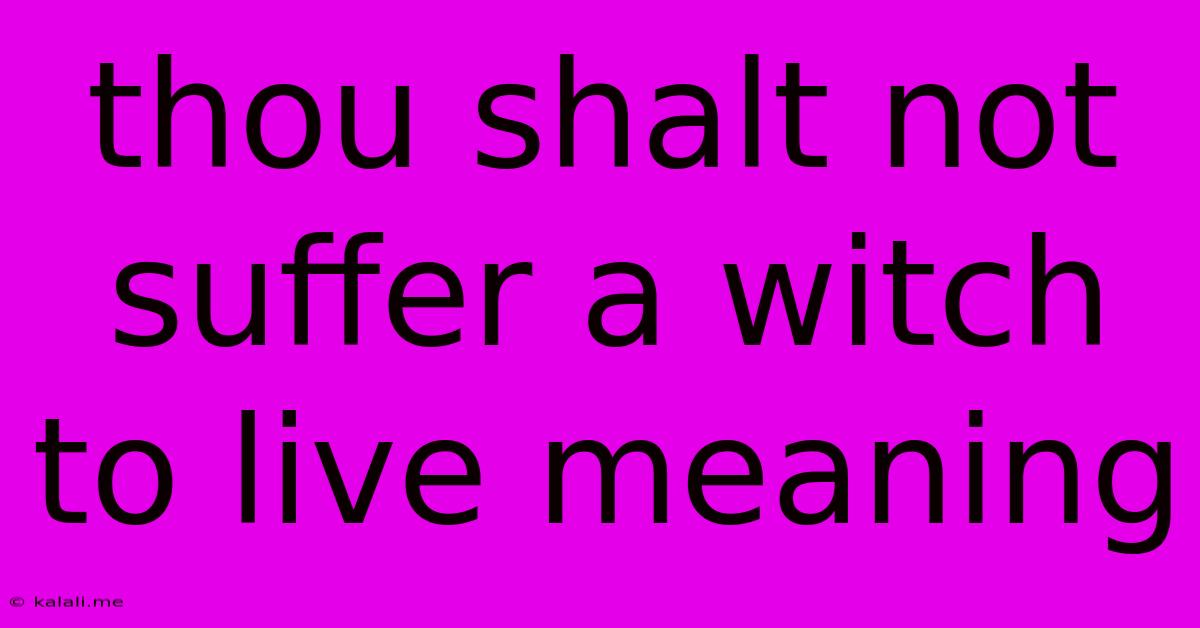Thou Shalt Not Suffer A Witch To Live Meaning
Kalali
May 24, 2025 · 3 min read

Table of Contents
Thou Shalt Not Suffer a Witch to Live: Unpacking a Controversial Commandment
The phrase "Thou shalt not suffer a witch to live" (Exodus 22:18, KJV) is a chilling and often misunderstood verse from the Old Testament. Its brutal simplicity has fueled centuries of persecution, fear, and misinterpretations. This article delves into the historical context, various interpretations, and the enduring legacy of this controversial commandment. Understanding its meaning requires careful consideration of ancient legal systems, cultural beliefs, and the evolution of our understanding of witchcraft.
The immediate impact of this verse is undeniable. It seemingly advocates for the death penalty for those accused of witchcraft. However, a simplistic reading ignores the complexities of the ancient Near Eastern legal landscape within which this law existed. The term "witch" in this context likely doesn't align with our modern understanding of witchcraft. The Hebrew word translated as "witch" – מקסֵפָה (mecashepha) – referred to someone practicing divination or sorcery, often for harmful purposes. This encompassed a broader range of practices than what we commonly associate with "witchcraft" today.
Historical Context and the Meaning of mecashepha
To truly grasp the meaning, we must examine the societal anxieties of ancient Israel. The practice of divination was prevalent in the surrounding cultures, often intertwined with pagan religious practices. The Israelites, striving to maintain their monotheistic faith, viewed these practices as a threat to their religious identity and social order. Therefore, the prohibition wasn't simply about condemning "witches" in a modern sense; it was about suppressing practices considered religiously and socially subversive.
It’s important to note that the punishment for mecashepha wasn't unique. Other transgressions against the law also carried the death penalty, reflecting the severity of the legal code in ancient societies. We must avoid applying modern sensibilities directly to this ancient text. The legal system of ancient Israel differed vastly from our own.
Interpretations and Modern Relevance
There are several interpretations of Exodus 22:18:
- Literal Interpretation: This approach takes the verse at face value, advocating for the death penalty for those practicing sorcery or divination. This interpretation has historically fueled persecution and violence.
- Figurative Interpretation: Some scholars argue that the verse should be interpreted symbolically, focusing on the spiritual dangers of idolatry and occult practices. The death penalty might represent the spiritual death resulting from turning away from God.
- Legal Context Interpretation: This view emphasizes the specific legal context of ancient Israel, arguing that the law reflects the society's attempt to maintain religious purity and social order. It wasn't necessarily a blanket condemnation of all forms of magic, but a specific prohibition against harmful practices.
The lasting impact of "Thou shalt not suffer a witch to live" is undeniable. This verse, however, should be read within its historical context and interpreted with caution and sensitivity to its potential for misuse. It is crucial to understand that the historical understanding of witchcraft significantly differs from contemporary beliefs. Therefore, directly applying this verse to modern contexts risks perpetuating harmful misconceptions and prejudice.
Conclusion: A Legacy of Misunderstanding
The phrase "Thou shalt not suffer a witch to live" remains a powerful and disturbing reminder of the dangers of misinterpreting ancient texts and the consequences of religious intolerance. Understanding its historical context, various interpretations, and the evolution of our understanding of witchcraft is crucial to avoid perpetuating harmful ideologies. Instead of fueling prejudice, this verse should encourage critical reflection on the dangers of superstition, the importance of contextual understanding, and the need for compassionate engagement with different perspectives. The lessons to be learned lie not in the literal application of a centuries-old law, but in the ethical implications of religious interpretation and the dangers of unchecked power.
Latest Posts
Latest Posts
-
How To Prove A Function Is Surjective
May 25, 2025
-
What Did Varys Do To The Sorcerer
May 25, 2025
-
How To Remove Paint From A Tub
May 25, 2025
-
Where Is Exp Share In Emerald
May 25, 2025
-
How To Send Files From Android To Iphone
May 25, 2025
Related Post
Thank you for visiting our website which covers about Thou Shalt Not Suffer A Witch To Live Meaning . We hope the information provided has been useful to you. Feel free to contact us if you have any questions or need further assistance. See you next time and don't miss to bookmark.